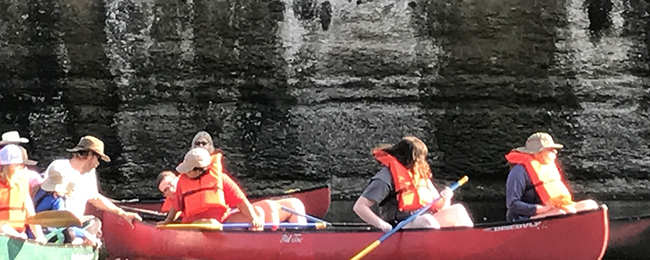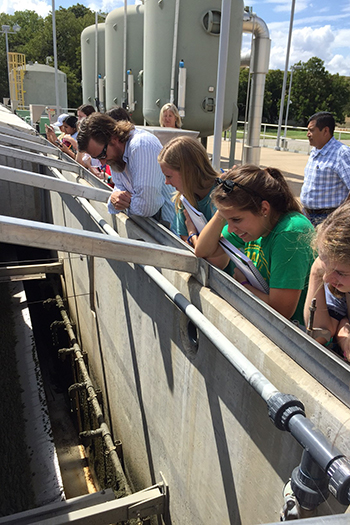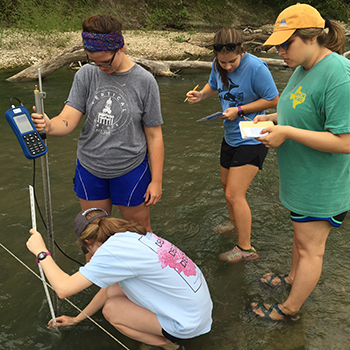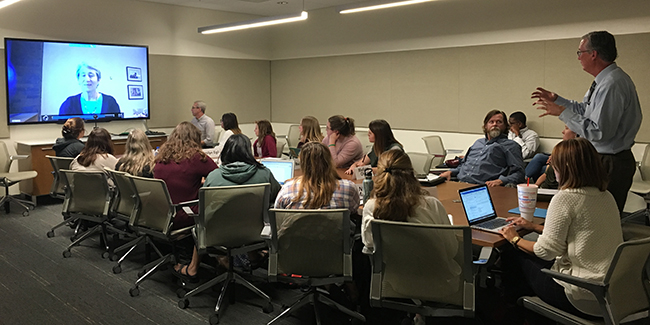The School of Education teamed up to offer a new kind of academic class at Baylor. This fall, Baylor launched a series of new classes to encourage collaboration among departments, faculty and students. Called “social innovation labs,” the classes are part of the wider Baylor Social Innovation Collaborative (BAY-SIC) initiative to develop deeper levels of problem solving through working with others and thinking differently.
The fall SOE offering was an interdisciplinary course called “Healthy River, Healthy Community.” The class encouraged students to investigate water issues around the world and in the Waco community. As faculty for the class, the SOE’s Dr. Sandi Cooper and Dr. Suzanne Nesmith were joined by instructors from Hankamer School of Business, the Department of Religion, College of Arts & Sciences, the Mayborn Museum, Informed Engagement, and the Center for Reservoir and Aquatic Systems Research. Cooper is professor of math education, and Nesmith is associate professor of science education and associate dean for undergraduate education.
Nesmith said that she jumped at the chance to work on the class, because it takes learning from looking at hypothetical problems and trying to dissect them into engaging and solving issues in real life.
“I’m passionate about this course because it provides students with an experience that can and should impact their approach to real-world problems for the rest of their lives,” she said.
There were 12 students enrolled in the Healthy River, Healthy Community class. Nine of them were undergraduate students studying a variety of majors including education, environmental science, English and University Scholars. There were also three graduate students who are working towards master’s degrees in Museum Studies.
Over the course of the semester, the class studied river literature as well as readings about water issues around the world. Beyond traditional readings, the class employed hands-on experiences to achieve the interdisciplinary standard set by BAY-SIC and give students a chance to learn interactively. Field activities like a Brazos River paddle trip, a Waco urban water experience, and sampling the Brazos water took students out of the classroom and let them see the water issues that surround them.
“This course is utilizing a multi-perspective approach to explore the wicked problem of water quantity and quality — a problem that must be addressed for the health and well-being of individuals, our area, state, country and nation,” Nesmith said.
In addition to readings and field studies, students participated in panel discussions, created plan proposals, developed educational programs for elementary students, and heard from people working to improve the water industry around the world. In November, the class hosted former United States Secretary of the Interior Sally Jewel via Skype to discuss global water management issues.
Baylor’s Andrew Hogue, who serves as the director of Civic Education & Community Service, is overseeing the BAY-SIC social innovation lab collaboration for the university. He said that the new labs are an exciting way that Baylor can bring departments together to tackle bigger issues.
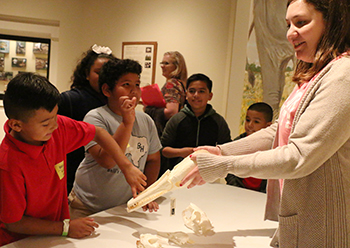
Bell’s Hill Elementary students visited the Mayborn Museum for an educational program developed by students in the “Health River, Healthy Community” class.
“None of the problems we face as a society can be solved by looking at just one perspective or discipline” Hogue said. “Our social innovations will show students that but also show them how easy it is to solve problems by working with people in other fields.”
Nesmith hopes that students, through interactive learning, will understand that problems are complex and that they don’t often have one answer, but that students can find the resources to examine their questions with multiple perspectives.
Nesmith and Cooper are joined in teaching the inter-disciplinary class by Dr. Julia Daniel, Dr. Tisha Emerson, Dr. Paul Martens, Dr. Cole Matson, Melissa Mullins, Ashley Thornton and Charlie Walter.
Now Baylor students can sign up for another SOE BAY-SIC class in the spring semester, taught by Dr. Nathan Alleman, associate professor in the Department of Educational Leadership. “Food, Identity and Society: The Student Experience” (SIC 4V98.2/5V98.2) grew out of research work by Alleman and doctoral student Cara Cliburn about hunger among college students. The course examines the role and importance of food in American society, including the social and individual effects of variable food access, particularly for college students. Students will get to participate in research and develop responses to campus hunger at Baylor and beyond. The class will meet Tuesday and Thursday from 2-5 and include interactive classes, field trips, and multi-disciplinary perspectives.
—By Olivia Berry
For more news from Baylor School of Education, visit the Instant Impact home page.
ABOUT BAYLOR SCHOOL OF EDUCATION
Founded in 1919, Baylor School of Education ranks among the nation’s top 20 education schools located at private universities. The School’s research portfolio complements its long-standing commitment to excellence in teaching and student mentoring. Baylor’s undergraduate program in teacher education has earned national distinction for innovative partnerships with local schools that provide future teachers deep clinical preparation, while graduate programs culminating in both the Ed.D. and Ph.D. prepare outstanding leaders, teachers and clinicians through an intentional blend of theory and practice.
ABOUT BAYLOR UNIVERSITY
Baylor University is a private Christian University and a nationally ranked research institution. The University provides a vibrant campus community for more than 16,000 students by blending interdisciplinary research with an international reputation for educational excellence and a faculty commitment to teaching and scholarship. Chartered in 1845 by the Republic of Texas through the efforts of Baptist pioneers, Baylor is the oldest continually operating University in Texas. Located in Waco, Baylor welcomes students from all 50 states and more than 80 countries to study a broad range of degrees among its 12 nationally recognized academic divisions.

